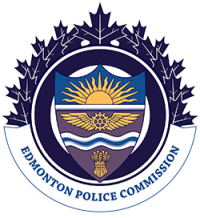Definitions:
Adequate, efficient and effective policing: are defined in the Government of Alberta’s Policing
Oversight Standards for Municipal Police Commissions as follows:
-
- Adequate policing is equitable and efficient:
- Equitable: Provides the community specified needed and desired level and standard of
service. - Efficient: Balance community specified needed and desired level and standard of service against
the cost.
- Equitable: Provides the community specified needed and desired level and standard of
- Effective policing meets specified goals developed by community and police:
- Community specified level and standard of service
- Level of service – resources available to police:
- Number of members (including civilian specialists) of an agency;
- Availability of members to do work; and
- Facilities and equipment
- Standard of service – nature and quality of work provided:
- Staff knowledge, skills and abilities;
- Equipment and specialized resources; and
- Organization oversight (internal): quality of supervision and management;
policies/procedures; planning/reporting.
- Adequate policing is equitable and efficient:
The legislative intent behind the creation of the Edmonton Police Commission (Commission) is to ensure that the Edmonton Police Service (Service) remains a separate and independent body from the municipality. The Police Commission has a unique relationship with Edmonton City Council (Council) and it exists, in part, to ensure an arm length relationship exists between the Service and the political decision-making process. The Commission is responsible for ensuring that the police provide adequate, effective, and efficient services.
The Commission is responsible to both the City of Edmonton and the Province of Alberta for exercising good governance in their oversight role of the Service on behalf of the general public, staff, volunteers, and other stakeholders.
Through the Police Act the Government of Alberta requires that the City of Edmonton establish a police commission through bylaw and to prescribe the rules governing its operations and appoint its members. The Act requires that the Commission oversee the Service and, to that end, it is expected to:
-
- Allocate the funds provided by Council;
- Establish policies providing for efficient and effective policing;
- Issue instructions, as necessary, to the Chief of Police in respect of the policies referred to in 2;
- Ensure that the Service employs sufficient persons for the purposes of carrying out the functions of the Police Service;
- In consultation with Service management, establish policing priorities and participate in strategic planning for the Service in Edmonton;
- In consultation with the Chief of Police, prepare estimates of all money required for each fiscal year and a yearly plan specifying the level of police service and programs to be provided in respect of the municipality.
- Appoint the Chief of Police, subject to ratification by City Council;
- Appoint a public complaint director;
- Receive public complaints;
- Monitor the public complaint process;
- Carry out independent reviews of public complaints made as to the policies of, or the services provided by, the Service, or the actions of a police officer;
- Consider appeals of the Chief of Police’s decision in complaints as to the policies of, or the services provided by, the Service; and
- Review complaints against the Chief of Police.
Guidelines:
-
- Individual Commissioners are appointed by Council. As a Commission, they are responsible to Council as a corporate body within the parameters of the Police Act.
- The Commission may make assignments to individual Commissioners, employee(s) or member(s) of a committee; however, the Commission retains ultimate responsibility and accountability.
- The Commission will account to Council and other key stakeholders through annual and periodic reports on the activities and finances of the Commission and of the Service.
- The Commission will provide access to minutes of Board meetings, as per FOIP regulations.
- The Commission will receive representations from the general public and will consult with key stakeholders.
- The Commission will operate in an open and transparent manner.
References:
-
- Police Act, RSA 2000, cP-17
- City of Edmonton Bylaw (No 14040), Edmonton Police Commission Bylaw, December 15, 2015
- Freedom of Information and Protection of Privacy Act
- Alberta Justice and Solicitor General December 16, 2014 – Alberta Policing Oversight Standards For Municipal Police Commissions
